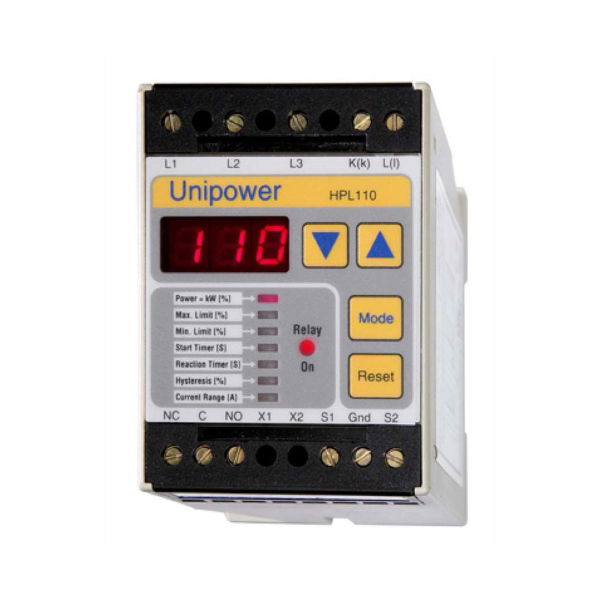Why Choose a kW-Based Load Monitor? What Engineers Need to Know About Unipower HPL110 and HPL500
Are You Really Protecting Your Motor? The Truth About Load Monitors and kW-Based Protection
Are You Really Protecting Your Motor? The Truth About Load Monitors and kW-Based Protection
If you've ever searched for “Why does my motor protection relay keep false tripping?” or “Why is my load monitor unstable after a VFD?”, you’re not alone. Many panel builders and engineers face these issues daily — and often, the root cause lies in using monitoring methods that are not suitable for modern applications.
⚠️ The Problem with Current and Power Factor Monitoring
Current and power factor (cosφ) monitoring have long been used for motor protection. However, both have serious limitations:
- Current is not proportional to mechanical load, especially under partial load.
- Power factor varies with motor design and load type, creating inconsistent readings.
- Both are sensitive to voltage fluctuations, leading to false trips and unreliable detection.
💡 The kW Advantage: True Active Power Monitoring
kW (real power) monitoring offers direct and linear correlation to mechanical load. It measures true power using:
P = √3 × U × I × cosφ
- Immune to supply voltage changes
- Accurate on clean sine-wave supplies
- Provides a reliable analogue signal proportional to actual load
🔧 The Unipower HPL110 – Compact Precision Load Monitoring
The Unipower HPL110 is a DIN-rail mounted, kW-based load monitor for 3-phase AC motors. It ensures accurate and stable protection across all load conditions on standard mains supplies.

Key Features:
- Built-in CT up to 8A, external CT support for larger motors
- Adjustable Min/Max thresholds with programmable delay timers
- Auto-reset function prevents nuisance tripping
- Ideal for pumps, blowers, conveyors, and fans
⚙️ The Unipower HPL500 – Advanced Monitoring (But NOT for VFD Outputs)
The HPL500 is an advanced load monitor for single and three-phase sine-wave supplies only. Due to PWM distortion, it must not be used after an inverter (VFD). It provides highly accurate load detection when installed on clean mains supplies.

Key Features:
- 100–575V AC operation, single or 3-phase
- Internal current range up to 40A (external CT up to 600A)
- Dual relays + 4–20mA analogue output
- MODBUS RTU communication (HPL500-MB & HPL500H)
- Optional shaft power (P2) with motor efficiency modelling
🧠 Choosing the Right Solution
If you’re asking questions like:
- “How do I prevent dry-run on pumps?”
- “How do I avoid false trips from voltage variation?”
- “Why is my load monitor unstable after a VFD?”
Then you need to use kW monitoring on clean, sine-wave supplies, and use the VFD’s internal load/torque monitoring on inverter outputs.
🚀 Get Started with Unipower
Bonus Downloads:
📈 Conclusion
Stop relying on outdated protection. Switch to kW-based load monitoring where it works best — on clean mains supplies — and use VFD-integrated protection for inverter-driven motors.